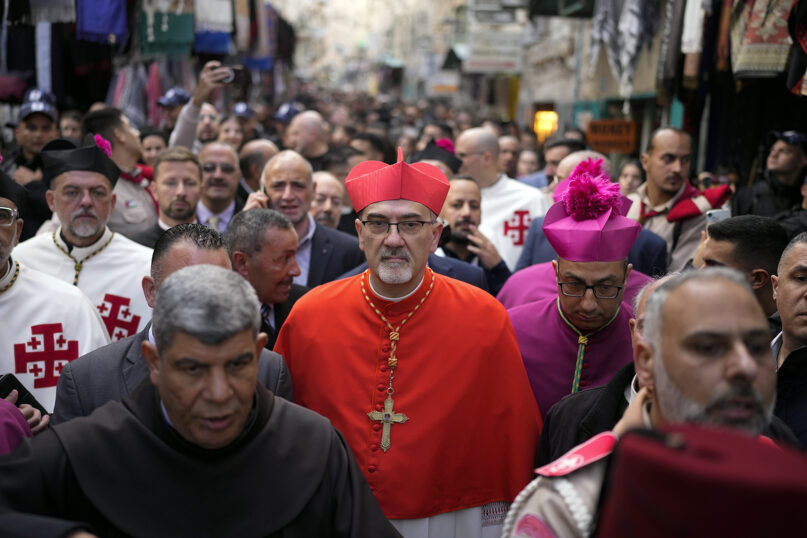JERUSALEM — Last year, Israelis marked Hanukkah and Christmas mostly quietly in their homes, synagogues, churches — and bomb shelters. Some 200,000 were displaced due to rocket fire from Gaza and Lebanon.
This holiday season, Israelis of all faiths are breathing a little easier, despite the country’s still-uncertain security, continuing displacement and the 100 hostages who remain captive by Hamas. The near absence of rocket fire from Gaza and Lebanon has meant that people are more open to congregating in public to light community Christmas trees, shop at outdoor holiday markets or attend a Hanukkah children’s festival.
In contrast to last year, Holy Land patriarchs and church leaders are again encouraging local Christians to publicly celebrate Christmas, provided they are “sensitive to the severe afflictions that millions in our region continue to endure.”
Although the decision to downplay Christmas last year was made “with good intentions,” the Christian leaders said in a November statement, “many around the world nevertheless misinterpreted this call to signify a ‘Cancellation of Christmas’ in the Holy Land — the very place of our Lord’s Holy Nativity.” Because of this, “our unique witness to the Christmas message of light emerging out of darkness (John 1:9) was diminished not only around the world, but also among our own people.”
Finding joy when Palestinians and Israelis are still dying in war “is extremely difficult,” acknowledged Maryam Khoury, a Christian from northern Israel who was visiting the Church of the Holy Sepulchre, believed to have been built over Jesus’ tomb, in Jerusalem. “But we can rejoice in Christ’s message of hope and love and provide hope and love to others.”
Rabbi Seth Farber, who leads the Kehilat Netivot synagogue in Ra’anana, said the onset of Hanukkah is especially bittersweet this year. “On one hand our community is feeling more optimistic,” he said. There are fewer air sirens, fewer military death notices and fewer local funerals. “On the other hand, the widows are still widows, the bereaved parents are still bereaved, and the children are still orphans.”
Although Hanukkah is a time of light and a celebration of heroism, “it is not possible to forget about the hostages and the nightmare they are living through,” Farber added. Recently, his synagogue celebrated the completion of a Torah scroll written in the memory of a young synagogue member killed on Oct. 7, 2023. “But we are not yet ready to have a Hanukkah celebration. The war and its aftermath are ever present in our prayers, and we continue to pray for the soldiers with an extra prayer every morning.”
Still, Hanukkah, like the other wartime holidays this year, must go on.
The synagogue will be holding an outdoor candle lighting each night of Hanukkah, with photos of the hostages placed near the menorah. “Hanukkah is about celebrating the miracle and publicizing it, but at present, alongside remembering the great moments of the past, we need to acknowledge the challenges of the present,” Farber said.
Hedva Fox, an educator, said she is striving to find positives this Hanukkah. “It seems that most of our history is made up of a dichotomy of both hope and despair — celebration and mourning. It’s okay to do both, to remember that you can celebrate and have hope for the future even if you also carry pain in your heart.”
The plight of Palestinians in Gaza, coupled with the almost complete absence of Christian pilgrims and subsequent loss of income, has added to the grim mood in Bethlehem. For the second year in a row, the municipality decided to forgo outdoor Christmas decorations, festivals and festivities, including the annual Christmas tree lighting and open-air Christmas market.
“For us, Bethlehem is part of the Palestinian heritage, and as a result of what’s going on in Gaza, and Israel’s continuous attacks, we Christians will concentrate on Christian prayers and prayers for peace,” Anton Salman, mayor of the small West Bank city, told the National Catholic Register. “Of course, each person can celebrate Christmas in their way. But for the city itself, due to the situation, there will be no festivals or decorations. We want to show the world that Bethlehem and the Palestinian people are still suffering.”

In Gaza, the tiny Christian community was overjoyed this week to pray with Latin (Catholic) Patriarch of Jerusalem Cardinal Pierbattista Pizzaballa, who received permission from Israel to visit the parish of the Holy Family in the embattled enclave.
Before the war, about 1,000 Christians lived in Gaza. Since then, the community has dwindled as hundreds of members have received permission to emigrate. More than 20 have been killed during the war, according to the patriarchate. Their homes damaged or destroyed, the remaining Christians have taken refuge at two church compounds.
During the Mass, Pizzaballa, dressed in white vestments, presided over a confirmation ceremony for several of the community’s children.
In his homily, the patriarch praised the congregation’s fortitude and faith. “You are the light of our church. We are proud of you, not because of anything in particular, but because you have remained what you are: Christians with Jesus.
“Just as all the people of the world, not only Christians, are with you, so too you can give something to the world that looks at you, bringing the light of Christ to everyone with your example,” Pizzaballa said.








